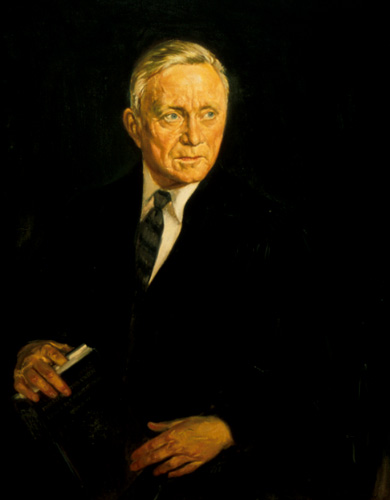Points of Rebellion (1970), p. 32–33
Other speeches and writings
William O. Douglas: Zitate auf Englisch
Dissenting, Sierra Club v. Morton, 405 U.S. 727 (1972)
Often referred to as Douglas' "trees have standing" case.
Judicial opinions
Speech at annual dinner of Fordham University Alumni Association, New York City (February 9, 1939), reported in James Allen, Democracy and Finance (1940, reprinted 1969), p. 291. This was Douglas's last speech as chairman of the Securities and Exchange Commission before his appointment to the Supreme Court.
Other speeches and writings
Dissenting, Sierra Club v. Morton, 405 U.S. 727 (1972)
Judicial opinions
“The Constitution is not neutral. It was designed to take the government off the backs of people.”
The Court years, 1939-1975: The Autobiography of William O. Douglas (1980), p. 8
Other speeches and writings
"The One Un-American Act," Speech to the Author's Guild Council in New York, on receiving the 1951 Lauterbach Award
Other speeches and writings
“We need to be bold and adventurous in our thinking in order to survive.”
Dissenting, Adler v. Board of Education of City of New York, 342 U.S. 511 (1952)
Judicial opinions
Dissenting, DeFunis v. Odegaard, 416 U.S. 312 (1974)
Judicial opinions
Points of Rebellion (1969)
Other speeches and writings
"The Dissent: A Safeguard of Democracy," 32 Journal of the American Judicial Society 104, 105 (1948).
Other speeches and writings
Interview with the New York Times (29 October 1973)
Other speeches and writings
Essay for This I Believe (1952)
Other speeches and writings
Points of Rebellion (1969)
Other speeches and writings
Writing for the court, United States v. Powers, 307 U.S. 214 (1939)
Judicial opinions
Dissenting, Colten v. Kentucky, 407 U.S. 104 (1972)
Judicial opinions
Writing for the court, Terminiello v. Chicago, 337 U.S. 1 (1949)
Judicial opinions
Go East, Young Man: The Autobiography of William O. Douglas (1974), p. 449
Other speeches and writings
The Bible and the Schools (1966), p. 58
Other speeches and writings
Writing for the court, Griswold v. Connecticut, 381 U.S. 479, 486 (1965)
Judicial opinions
Dissenting, United States v. Columbia Steel Co., 334 U.S. 495 (1948)
Judicial opinions
Dissenting, Roth v. United States, 354 U.S. 476, 512 (1957)
Judicial opinions
Writing for the court, Day-Brite Lighting, Inc. v. Missouri, 342 U.S. 421 (1952)
Judicial opinions
